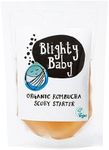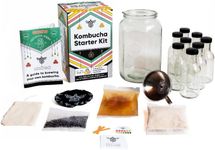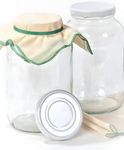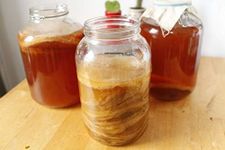Buying Guide for the Best Kombucha Starter Kits
Choosing the right kombucha starter kit is essential for anyone looking to brew their own kombucha at home. A good starter kit will provide you with all the necessary tools and ingredients to get started, ensuring that your brewing process is smooth and successful. When selecting a kombucha starter kit, it's important to consider several key specifications to ensure that the kit meets your needs and preferences. Here are the key specs to look out for and how to navigate them.SCOBY QualitySCOBY stands for Symbiotic Culture of Bacteria and Yeast, and it's the living culture that ferments the tea into kombucha. The quality of the SCOBY is crucial because it directly affects the taste and health benefits of your kombucha. Look for a thick, healthy SCOBY that comes from a reputable source. A good SCOBY should be at least 1/4 inch thick and free from any signs of mold or contamination. If you're new to brewing, opt for a kit that includes a well-established SCOBY to ensure a successful first batch.
Tea and SugarTea and sugar are the primary ingredients that the SCOBY will ferment to create kombucha. The type of tea (black, green, white, or oolong) can influence the flavor of your kombucha. Black tea is the most common and provides a robust flavor, while green tea offers a lighter, more delicate taste. The sugar is necessary for the fermentation process, and most kits will include organic cane sugar. Choose a kit that includes high-quality, organic tea and sugar to ensure the best results.
Fermentation VesselThe fermentation vessel is where the magic happens. It's important to choose a kit with a vessel that is made of safe, non-reactive materials like glass or food-grade plastic. Glass is preferred because it doesn't leach chemicals and allows you to see the fermentation process. The size of the vessel is also important; a one-gallon jar is a good starting point for beginners. Make sure the vessel comes with a breathable cover to keep contaminants out while allowing gases to escape.
pH Strips or MeterMonitoring the pH level of your kombucha is important to ensure it's fermenting properly and is safe to drink. The ideal pH range for kombucha is between 2.5 and 3.5. Some starter kits include pH strips or a pH meter to help you keep track of the acidity. If you're new to brewing, having these tools can be very helpful. Choose a kit that includes pH testing tools to ensure your kombucha is fermenting correctly.
Instructions and SupportBrewing kombucha can be a bit tricky for beginners, so having clear, detailed instructions is essential. Look for a starter kit that includes a comprehensive guide with step-by-step instructions, troubleshooting tips, and recipes. Some kits also offer online support or access to a community of brewers. This can be invaluable if you run into any issues or have questions along the way. Choose a kit that provides ample support to help you succeed in your brewing journey.
Additional AccessoriesSome starter kits come with additional accessories that can make the brewing process easier and more enjoyable. These might include items like a funnel, strainer, thermometer, or flavoring ingredients. While not strictly necessary, these extras can be very helpful, especially for beginners. Consider what accessories are included in the kit and whether they will be useful for your brewing process. Choose a kit that offers the right balance of essential tools and helpful extras.








